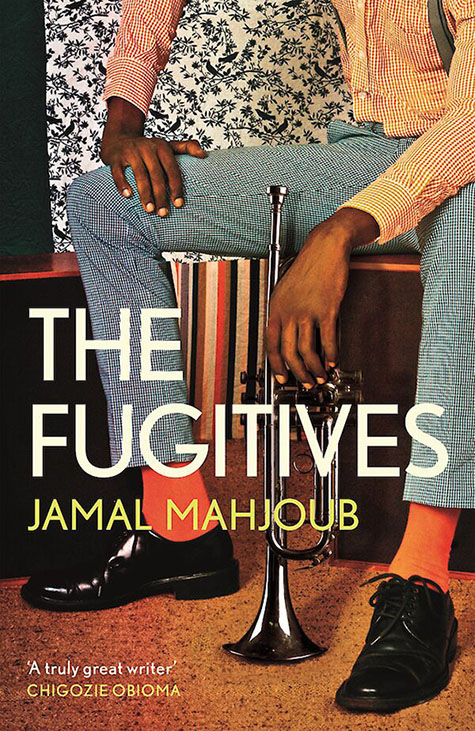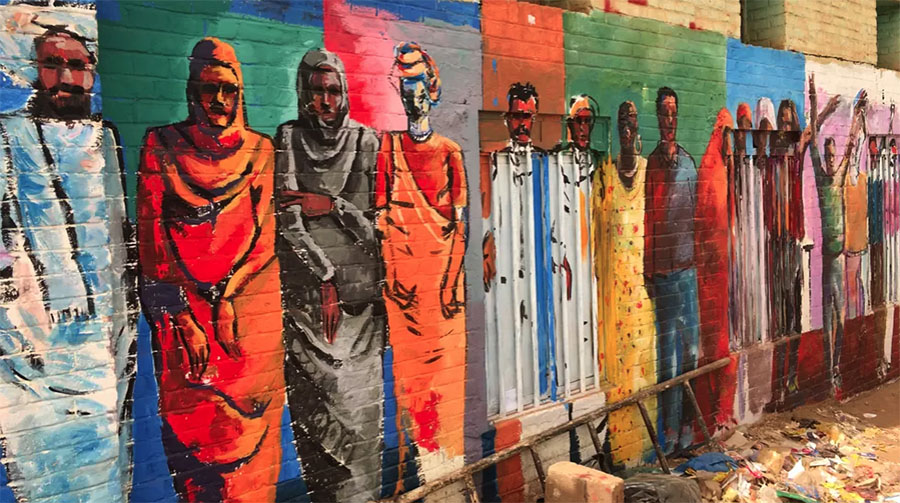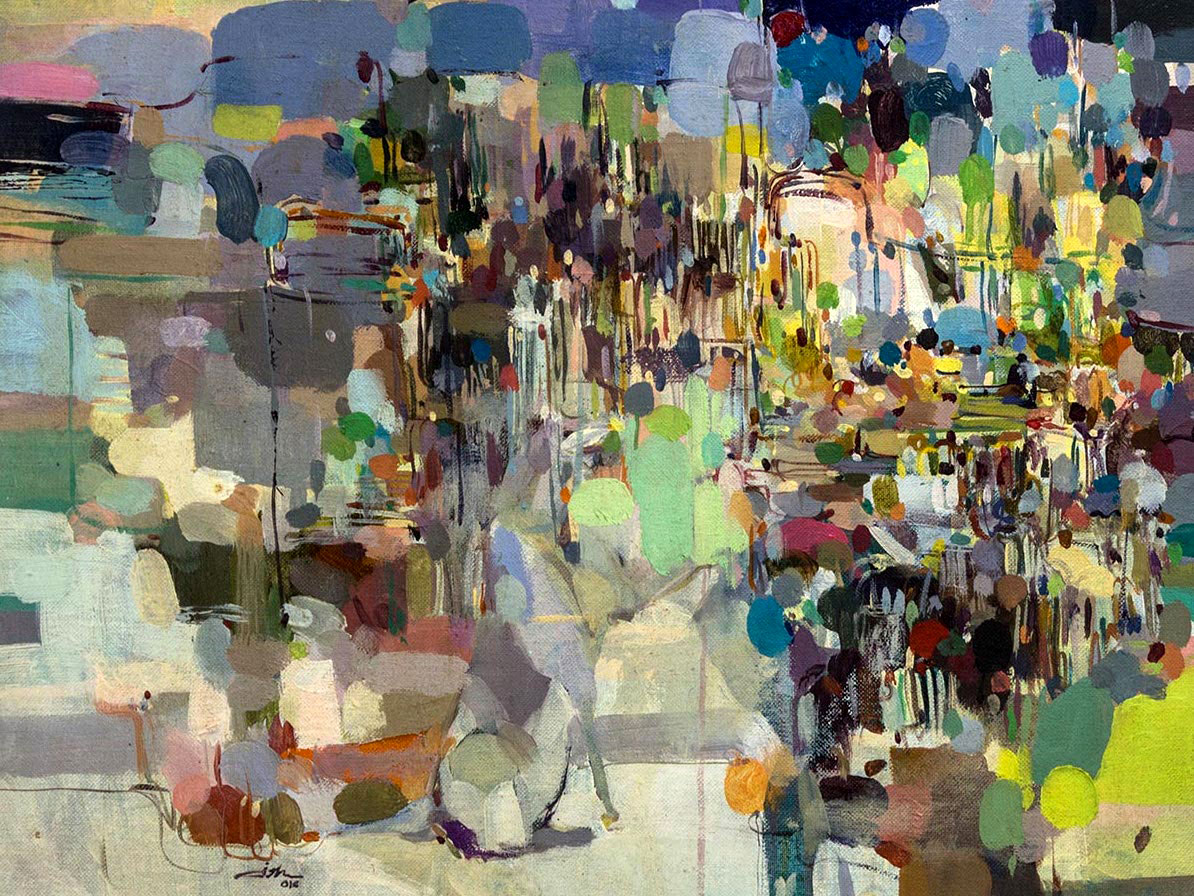The Fugitives, a novel by Jamal Mahjoub
Canongate 2022
ISBN 9781838850821
David Rife
The Sudanese British writer Jamal Mahjoub begins his most recent novel, The Fugitives, by having his narrator-protagonist Rushdy Hassan describe the book as “a story about a band,” one that “died its own natural death” and miraculously came back to life. Rushdy goes on to proclaim music as his religion and John Coltrane, Sonny Rollins, Al Balabil, “and, of course, our very own Kamanga Kings, the greatest of all,” as his saviors. Music and miracles are emphatically at the heart of The Fugitives in the way they enable a satirical, provocative cross-cultural narrative that dramatizes what are generally perceived as radical differences between the repressive culture of Sudan and the supposedly free culture of the United States. So when Rushdy and his bandmates are offered an opportunity to see what life is like “on the other side,” they jump on it. The adventures that follow are humorous and electrifying but occasionally repetitive.

The vignette of Rushdy’s quotidian existence that begins the story in earnest dramatizes why he and countless others crave a change of scenery. Rushdy is a pudgy, myopic secondary school teacher in Khartoum, Sudan, whose 50 students are sons of low-ranking military officers and unscrupulous public officials. His subjects are English and history, but they might as well be thermodynamics and epistemology for all the interest they engender. Rushdy leaves school each day to crushing heat, dust, and an overcrowded bus that takes him to the home he shares with his mother and Uncle Maher. His despondence is deepened by his obsession with accomplishing something that would impress the legendary father he never knew — the father who had, with Uncle Maher, fronted the Kamanga Kings. Rushdy’s only diversions are listening to old jazz with Uncle Maher and jamming with his buddy Hisham — Rushdy on his dad’s sacred trumpet, Hisham on keyboard.
This is hardly enough to lighten the burden of his hopelessness but then the first of several miracles and fairytale events occurs, triggering Rushdy’s transformation. Uncle Maher receives an official letter from the US inviting the Kamanga Kings to perform in three months’ time at the Kennedy Center in Washington, DC, at an all-world musical celebration. “Impossible,” says Uncle Maher, as most of the Kings’ members have long since died or dispersed. In an unexpected spurt of character growth, Rushdy realizes the Kings’ legacy is his lifeblood and decides to re-form the band and resurrect its legend — to reach, in three months, “an ecstatic, heightened state” of musical bliss that the Kings took decades to perfect, something “akin to that of those mad dervishes who spin in dusty circles wailing their Sufi chants in search of enlightenment and oneness with God.”
With the help of Uncle Maher and Hisham, Rushdy assembles a group and rehearses them to exhaustion, until they start to sound like the Kings of old. As they are about to leave for America, a financial glitch interferes with their plans. But then another seeming miracle occurs in the person of one Suleiman Gandoury, who offers to underwrite all costs and even suggests an expanded East Coast tour for the income it might generate. Without asking, he has become their manager. Rushdy suspects an ulterior motive in Gandoury’s offer, but defers to his uncle, who vouches for him. Anyway, what could they do otherwise?
One of several pleasures of this novel is its exploration of the theme of collaborative ecstasy: how, through dedication and hard work, a disparate group can come together as one and create a moment that elevates their lives.
The novel’s high point is the band’s spectacularly triumphant concert in the American capital. After a bout of anxious anticipation, “Somehow,” relates Rushdy, “we managed to reach down into some place in our souls of whose existence we were hardly aware normally.” The result? “[T]here were moments that evening when we managed to surpass anything we had achieved in our rehearsals. Something magical came over us.” Overnight, the new Kings become famous. They can now return to Sudan as conquering heroes who have brought honor and respect to their homeland.
One of several pleasures of this novel is its exploration of the theme of collaborative ecstasy: how, through dedication and hard work, a disparate group can come together as one and create a moment that elevates their lives. We’re told that the elderly players from the original Kings even looked and acted young again. Other themes worth contemplating concern the cultural and historical differences between Africa and the United States — between authoritarian regimes and supposedly free democracies. When the Kings see then-President Trump bloviating on TV, they are distressed to be reminded of his despotic immigration policies and flagrant racism.

The Fugitives is also centrally interested in the relationship between the past and present, specifically how one can come to terms with the present to live in the moment. Thus, by developing his own musical expertise, Rushdy no longer needs to worship at the throne of his legendary father. He’s become his own man. This theme and several related to it are sprinkled throughout the novel, though they are seldom developed. Rather, they are intended to nudge the reader into thinking about such compelling matters as the nature of freedom and cultural dislocation, a successful strategy.
The Kings’ return to the homeland must be postponed when they discover that their money and passports have gone missing. Has anyone seen Gandoury lately? They must remain in the hotel under house arrest or try to escape. They run, of course, thereby turning the novel into a fast and furious thriller as the band tries to track down Gandoury while simultaneously eluding immigration authorities. The atmosphere becomes more intense as they navigate diners and other places where a troupe of strangers chattering in an unfamiliar language creates suspicion and fear. At one stop, they see themselves on TV while “a man with an orange face and crazy hair” shouts at an audience. Everyone in the world would recognize the talking head and guess what he was saying. Muslims in particular would feel threatened.
In a coincidence that would make even Dickens wince, the Kings at one point find themselves at an estate where the weaselly Gandoury had booked them to perform at the wedding of a Jewish bride and her anti-Sudanese African immigrant bridegroom. So not only are the band, who hail from a predominantly Arab country, playing for Jews, but they are identified as Falashas (a derogatory term for Ethiopian Jews). By this time, the novel has lost its way. If it were subjected to formal analysis, it would be found seriously lacking: too many jarring coincidences, extravagant scenes, and weak character development. Feminist critics would, of course, have much to say about its patriarchal point of view.
But we should remind ourselves that The Fugitives is Rushdy’s “creative memoir” and that he is just now, after the fact, attempting to put his recollections in order. In so doing, he enables the author’s social and political satire — as well as his own good-natured self-actualization. And the Kings, Rushdy included, re-reform their orchestra when they return home and find themselves much in demand, as far away as Europe! How better to end a novel that begins in despair and thrusts its characters into such large challenges as racism and delusory dreams? The Fugitives is finally a pleasurable, provocative read for its appealing style, affectionate portrayal of its central character, and deepening of the eternally vexatious discourse involving freedom and dislocation.




